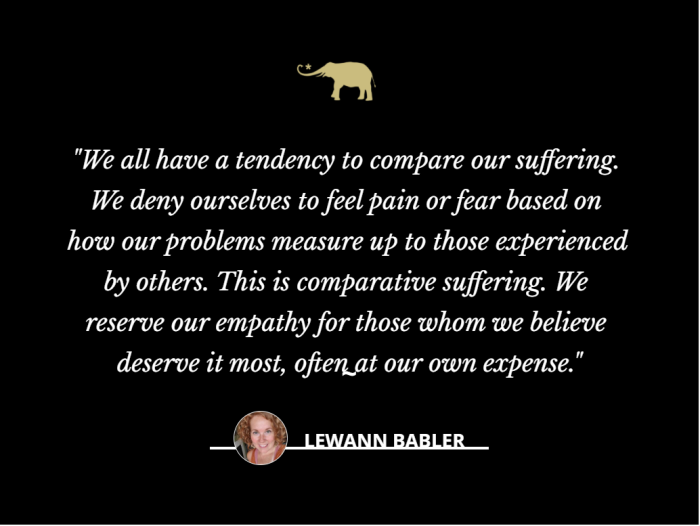You’re not a jerk for prioritizing your personal feelings during times of collective crisis. Doing so is actually a necessity in practicing true empathy and compassion.
Two years ago, Brené Brown released a 28-minute podcast episode on comparative suffering. I’ve listened to this gem at least a dozen times since. In March of 2020, as the overwhelming uncertainty of the global pandemic was taking off, I had just unexpectedly lost my beloved calico kitty, Dotti, to an undiagnosed brain tumor.
While she lived a healthy 16-year life as my loyal companion through college, marriage, and motherhood, I felt like a total asshole for grieving her loss when fellow humans around the globe were suffering in much bigger ways.
Who am I to be sad?
Who am I to complain?
I have it pretty damn good. I should be considerate of others with real problems, not wasting time being upset over my meaningless dead cat.
The introduction to comparative suffering through one of my favorite authors and researchers has helped me thoughtfully navigate personal challenges with perspective amidst the collective chaos we’ve all endured over the past two years.
From the Comparative Suffering, the 50/50 Myth, and Settling the Ball episode of the Unlocking Us podcast:
“When we practice empathy with ourselves and others, we create more empathy. Love, y’all, is the last thing we need to ration in this world. The exhausted doctor in ER room in New York doesn’t benefit more if you conserve your kindness only for her and withhold from yourself or your co-worker who lost her job. The surest way to ensure you have a reserve of compassion and empathy for others is to attend to your own feelings.”
She goes on to describe empathy as the antidote to shame.
“Shame is a very egocentric, self-involved emotion and draws our focus inward. Our only concern with others, when we’re feeling shame, is to wonder how others are judging us. When we feel shame, our inward focus overrides our ability to think about other peoples’ experiences. We become unable to offer empathy and we’re incapable of processing information about that other person, unless that information specifically relates to us. So, let’s stop ranking suffering. There’s enough love and empathy to go around. Putting ourselves down because we’re struggling, because we have it so much better than others right now, can kill our empathy for others.”
I needed to relisten to this podcast this morning.
I’m currently grieving the recent loss of my seven-year-old son. While most nights since Leo’s passing have been relatively sleepless, waking up last night was different. I reveled in our soft linen bedding, where I’m just warm and cozy enough to prefer my feet kicked out. My heart felt at ease, with my husband dozing next to me and our chow-Eskimo-retriever-mixed elderly pup dreaming away with intermittent subtle whimpers. Outside our bedroom window, the neighborhood is safe and quiet.
Rather than my usual ruminating thoughts about the loss of our son and the future we’ll be living without him by our sides— paired by the desire to crawl out of bed to lay on the floor of his room in the fetal position—my mind went straight to Ukraine.
I envisioned the women with newborns taking shelter in basements, kids fleeing the country with their mothers while leaving their fathers behind to fight, the elderly unable to travel—all while the Russian military continues their senseless and violent invasion.
Next, a meme that was shared earlier in the day on Instagram popped into my mind, referencing “the only difference between you and a refugee is luck.” It’s true, isn’t it? I immediately felt shame and guilt for not compartmentalizing my personal grief for the time being, and rather focusing it on the bigger picture. I fell back to sleep thinking, “I should be grateful.”
I awoke this morning feeling overwhelmingly sad, horrified, consumed, and helpless. Opting to bypass and belittle my own issues in an effort to better see the world’s current events only increased my at times paralyzing anxiety.
Queuing up this podcast, followed by a short five-minute meditation, grounded me.
We all have a tendency to compare our suffering. We deny ourselves to feel pain or fear based on how our problems measure up to those experienced by others. This is comparative suffering. We reserve our empathy for those who we believe deserve it most, often at our own expense.
According to Brown, we have enough empathy for others without having to deny our own right to be heartbroken, overwhelmed, or afraid. The more we use our empathy, even on ourselves, the more our empathy multiplies.
Choosing to identify our personal grief as genuine pain and suffering allows us to show up for others who are experiencing hardship. It all starts with honoring our own challenges versus focusing on the spectrum of comparison.
Sympathy cards adorned with doves, lilies, and cursive text from well-meaning loved ones have provided written reminders that losing a child is the single hardest thing anyone can experience. While yes, the relentless grief is obviously excruciating, I’m not interested in winning the emotional pain, suffering, and hardship trophy. Grief is relative and must not be used with a spectrum or hierarchical mentality.
In Theodore Roosevelt’s words, “Comparison is the thief of joy.” We also need to remember how comparing our suffering often suppresses the magical beauty of empathy and showing up for those in need.
When writing this piece, I experienced some pretty heavy doubts in my consideration to publish. I feared my message from the heart may come across as naïve or trivial, given the grand scheme impacting our world.
Doing a quick poll on my Instagram stories, testing the waters to see if others were experiencing similar feelings on their own problems while navigating the barrage of widespread suffering out of Ukraine, boldly underlined that I wasn’t alone.
There was a common thread shared by a few friends on comparative suffering, one, in particular, advising that, “What other people are going through is terrible. Mine is all in my head. I’m making me suffer.”
This reminded me of the well-known Buddhist teaching, the parable of the second arrow:
“The Buddha taught that when the world shoots an arrow into us, it hurts! This unavoidable pain is good to acknowledge. We often get hit by a self-inflicted second arrow, which signifies the story we spin around our pain as a way of resisting the experience of the first arrow. This additional suffering can manifest in many different ways, such as: guilt, anger, shame, or overwhelming catastrophizing.”
If we can bravely sit and care for the original painful feeling (the first arrow), even though it feels especially hard, scary, or even selfish given the additional global suffering, we can avoid spinning up a narrative.
In the long run, honoring our personal suffering head-on allows us to be more productive and proactive for ourselves—hence freeing up our emotional and physical bandwidth to help others.









Read 49 comments and reply